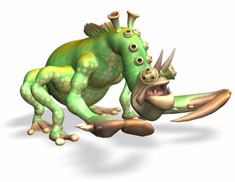 Electronic Arts may be considering the Spore system as an “Engine” for licensing to other developers to build RPG’s, action games, web-based games and many other options. Much like ID Software and Epic Games have done, this could be a build system for new creative additions to the industry.
Electronic Arts may be considering the Spore system as an “Engine” for licensing to other developers to build RPG’s, action games, web-based games and many other options. Much like ID Software and Epic Games have done, this could be a build system for new creative additions to the industry.
Considering the amount of crazy Spore mini-games that have hit the street in the last few months, it seems possible EA’s already using this technique in-house to build hype and extension to the Spore product line. Usually such engines are licensed by smaller developers (smaller compared to Electronic Arts anyway) and not a big publisher such as EA.
Frank Gibeau, president of Electronic Arts’ Games Label says, “What’s so beautiful about Spore is that it’s extremely malleable, you could add RPG or action, you could take it to different platforms, like (Web-page) flash games, the PlayStation 3, the Xbox 360, Nintendo’s Wii” (kotaku)
While EA did use the word “you could” they may be referencing the fact that “one could do it, if they worked at EA.” Electronic Arts wants to win the battle of the publishers, no doubt, and they continue to grow in size; would they let loose the Spore engine on outside developers? Or, would they keep it as an in-house engine for their own groups to leverage in future projects?

0 thoughts on “Imagine a Spore Engine, Might Be Real”